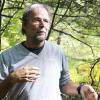
Contact Brian
Brian Schultz
413.549.4600

Brian Schultz
413.549.4600
Brian Schultz, associate professor emeritus of ecology and entomology, received a B.S. in zoology, an M.S. in biology, and a Ph.D. in ecology from the University of Michigan.
An agricultural ecologist and entomologist who does research at the Hampshire College Farm Center, Schultz has spent a number of years in Central America and the Caribbean studying methods of insect pest control. He is also interested in statistical analysis and world peace.